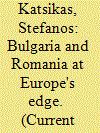|
|
|
Sort Order |
|
|
|
Items / Page
|
|
|
|
|
|
|
| Srl | Item |
| 1 |
ID:
129210


|
|
|
|
|
| Publication |
2014.
|
| Summary/Abstract |
Bulgaria and Romania joined the European Union as full member states on January 1, 2007. This momentous event was the culmination of a long and demanding political project that has often been described as "Europeanization." Although the foundations of this project were laid fairly soon after the fall of both countries' communist regimes in 1989, the pace was slow, and did not really gain momentum
until the end of the 1990s. Over the years the project ebbed and flowed, but what kept both nations committed was their strong belief that joining the EU would fill the political, economic, and security vacuum that the dissolution of the communist bloc had produced. EU membership was popularly seen as a panacea that would allow Bulgaria and Romania to stabilize their newborn democratic systems and overcome the economic problems of the postcommunist transition. It offered confirmation that the Bulgarians and Romanians were really Europeans. Seven years later, however, rather than feeling pulled into the heart of Europe, Bulgaria and Romania find themselves at the edge. Their EU partners raise questions about their commitment to the rule of law and their willingness to crack down on organized crime and illegal immigration. Does this mean that membership has not been an easy route to democratic stability, economic growth, and greater opportunity for all? European integration may be a difficult topic at a time when economic crisis has, for some, cast the entire effort into doubt. But the situation of Romania and Bulgaria lends itself to reflection on the wider project and its overall historical importance.
|
|
|
|
|
|
|
|
|
|
|
|
|
|
|
|
| 2 |
ID:
174231


|
|
|
|
|
| Summary/Abstract |
A central distinction between authoritarian and democratic systems is their view of information. Democracies believe in—and depend on—the open and free exchange of information that empowers citizens to make informed decisions to select their representatives and engage in political debate. 1 They champion freedom of expression, association, and press as universal rights. The International Covenant on Civil and Political Rights captures this vision: “Everyone shall have the right to freedom of expression; this right shall include freedom to seek, receive and impart information and ideas of all kinds, regardless of frontiers, either orally, in writing or in print, in the form of art, or through any other media of his [sic] choice.”
|
|
|
|
|
|
|
|
|
|
|
|
|
|
|
|
| 3 |
ID:
074851


|
|
|
|
|
| Publication |
2006.
|
| Summary/Abstract |
This paper examines the impact of the form of government-presidential or parliamentary-on fiscal outcomes in democratic systems. Based on data for democracies in 98 countries between 1970 and 2002, it shows that the gross domestic product ratio of the central government budget balance is higher in presidential than in parliamentary democracies. It also shows that this impact is not due to the fact that presidential systems are not subject to the "costs of coalition" that allegedly afflict parliamentary democracies: the coalition and status of the government are of no consequence for budget balances in either presidential or parliamentary systems. Presidential systems matter for budget balances because they generate relatively high incentives for governments to keep budgets under control. They do so because in presidential systems, unlike in parliamentary systems, voters are by design able to identify and punish those responsible for economic policies. Presidents, however, vary in their capacity to affect budget policies. This paper demonstrates that presidential systems in which presidents are constitutionally able to dominate the budget process or to effectively veto legislation tend to have higher budget balances than those in which the budget process is dominated by the legislature or the president is unable to exercise existing veto powers.
|
|
|
|
|
|
|
|
|
|
|
|
|
|
|
|
|
|
|
|
|